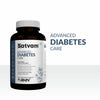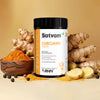Living with diabetes can be an everyday challenge. Optimal nutrition and physical activity are the core essentials of a healthy lifestyle for anyone with diabetes. One cannot crack the code of dealing with diabetes and staying fit overnight. But you do get closer to it with every stride. Making healthier changes in your diet and altering everyday habits can help you lead a more diabetes-friendly life.
It is important to understand that no two people with diabetes are the same. Hence there is no one-size-fits-all ideal diet or lifestyle. However, you can always monitor your diet and be more active to lead a healthier life with diabetes. In this blog, we provide you some essential tips for daily diabetes management.
How can Diet and Lifestyle Management Help with Diabetes?
Benefits of mindful eating and lifestyle management could be multifold for diabetes patients. This journey can be difficult in the beginning but with the right kind of support, you can attain optimum benefits. Being physically active and following a well-balanced meal plan can tremendously help with blood glucose level management. You can manage your blood sugar levels easily by eating and drinking right, along with regular exercise and medication.
Here is how proper eating habits and lifestyle changes can help.
- Maintain blood glucose levels in targeted range
- Keeps cholesterol and blood pressure in check
- Lose weight or maintain healthy weight
- Have more energy throughout the day
- Feel good and manage mental well-being
Diet Tips for Diabetes Management
Firstly, let us burst the biggest myth surrounding diet and diabetes. You DO NOT have to totally give up all your favourite foods to manage blood sugar levels. As per the guidance of your healthcare provider, you can enjoy these foods in smaller portions and less frequently. Also remember that food and diabetes are co-related, as what you eat affects your blood sugar levels directly.
The key to a diabetes-friendly diet is to include a variety of healthy foods from different food groups. Here are some of the best diet tips for you.

Consume Healthy Fats
Skip cooking foods in cream or butter. Cut down on using oils and instead steam, bake or grill your food. Quit consuming processed foods as they are high in unhealthy trans-fats. Research shows that trans-fats may increase insulin resistance and the risk of Type 2 diabetes. On the other hand, unsaturated fats can improve insulin sensitivity and enhance sugar metabolism.
Typically, unhealthy saturated fats comprise of dairy and high-fat meats like processed meats, high-fat pork, animal fat, whole meat, butter, cheese, and cream. Healthy unsaturated fats are mostly found in plant oils, nuts, and fish. Consume more of olive oil, sunflower oil, canola oil, corn oil, salmon and sardines, almonds, peanuts, avocados, flax seeds, pumpkin and sesame seeds.
Consume More Fruits and Vegetables
Eating plenty of fruits and vegetables can help you gain the fibers, vitamins, and minerals that your body needs on a daily basis. It is a great way to eat your fruits and vegetables as salads when you feel hungry in between meals. By doing so, you can avoid unhealthy snacking and overeating.
You do not have to avoid fruits as they contain natural sugar which is different from the added sugars in chocolates, cakes, cookies, and biscuits. However, fruit juices may contain added/artificial sugar so it is best to consume whole fruits. Here are some diabetes-friendly fruits and vegetables:
Fruits: Apples, Citrus fruits like oranges, Berries and Cherries
Vegetables: Sweet potato, Leafy greens, Asparagus, Red onion, Broccoli, Zucchini
Choose Healthier Carbohydrates
Knowing your healthy and unhealthy carbs is very important. All carbs turn into sugar, affecting blood glucose levels; but you can choose healthier carbs and regulate your portion sizes. Below mentioned are some sources of healthy carbohydrate.
- Whole fruits
- Vegetables
- Whole grains like brown rice and whole oats
- Unsweetened dairy products like milk and yogurt
- Pulses like beans, lentils and chickpeas
Try to cut down on white rice, white bread, and highly-processed cereals as these foods are unhealthy carbohydrates and low in fiber.
Cut Down on Added Sugar
Do we even need to say this? Cutting down on added/artificial sugar is an essential step towards maintaining blood glucose levels. It can also help in weight management. Take small practical steps instead of instant hasty transformation. Swap fruit juices with whole fruits; energy drinks and sugary beverages with sugarless tea/coffee, plain milk, and water.
You can also use non-sugar sweeteners for a short period of time while making the transition. Reduce the overall sugar intake in your diet in the long run.
Consume Less Red and Processed Meat
Processed meats are high in sugar content that may contribute to insulin resistance, increased risk of diabetes, and high cholesterol levels. A recent study found that people consuming higher amounts of processed and red meat are more likely to develop Type 2 diabetes, as compared to those who consumed less. Research highlights that heme iron in red meat is responsible for pancreas damage resulting in insulin resistance.
Processed products can be especially unhealthy for people living with Type 1 or Type 2 diabetes, because they can affect blood glucose control.
Stay Hydrated
Staying hydrated is super important for your overall health, and it's also a big help if you're dealing with diabetes. When you drink enough water, it helps keep your blood sugar levels in check and stops you from getting dehydrated – something that happens a lot to folks with diabetes. Try to drink at least eight glasses of water every day, but remember, everyone's different, so you might need more or less.
Lifestyle tips for diabetes management
Adhere to your Diabetes Treatment
Sticking to your diabetes treatment is like embarking on a journey where you keep learning and adapting. Sure, there will be bumps in the road, but if you stick to the plan and adjust when needed, you'll navigate it like a pro. Adhering to your diabetes treatment and making lifestyle changes might feel tough, but think of it as an essential investment in your future health. Get to know your treatment, establish a routine, and adopt a balanced lifestyle to take charge of your diabetes and enjoy a satisfying life.
Regular Exercise
Staying active and engaging in regular exercise go hand in hand with eating a healthy diet. Regular physical activity is an essential part of blood glucose management. It improves blood flow, lowers blood glucose levels, improves mood and sleep quality, and lowers blood pressure. Exercise also promotes enhanced sugar utilization into energy, reduces blood glucose level, and improves insulin secretion.
Schedule 30 minutes for physical activity at least 5 days per week.
Stop Smoking
Did you know that people who smoke cigarettes are more likely to develop Type 2 diabetes by up to 40% as compared to non-smokers? Nicotine impacts blood sugar levels directly causing it to rise and making it difficult to handle. Moreover, people already dealing with diabetes who smoke frequently need larger doses of insulin to maintain their blood sugar levels at the targeted range.
Smoking also elevates the risk of health conditions that you are already more prone to due to diabetes. It also makes exercising difficult. Resolve and quit at the earliest. Seek help if needed.
Limit Alcohol Intake
Reducing the intake of alcohol can be an effective way to manage blood sugar levels. Alcohol can make your blood sugar go too low or too high, hence check your sugar levels before you drink and balance your drinks with food.
Go for Regular Checkups
It is crucial to go for regular health checkups if you have diabetes. Take your BSL and HbA1c checkups that are the markers for high blood sugar levels. Get your screening done every 3 to 6 months to manage spike and other related problems at an early stage. Regular Type 2 diabetes checkups can also help reduce the risk of other associated conditions. Some basic health checkups for diabetes include:
- A1c Test
- Lipid Profile
- Foot Examination
- Kidney Function Tests
Manage Stress
Stress makes your blood glucose levels rise up. While feeling anxious and stressed, practice meditation, yoga, and other relaxation techniques. Another simple and effective way to manage stress is to take a walk amidst nature. It will help you unwind and clear your head.
Supplements
According to the American Diabetes Association, adopting a plant-based diet is one of the several dietary approaches that can effectively reduce the risk of Type 2 diabetes or help to manage it. Satvam Nutrition’s Advanced Diabetes Care is an all-natural, chemical-free, and sugar-free supplement for improved sugar utilization, insulin production, and blood sugar metabolism. Other vital vitamin and mineral supplements like Vitamin B12, Vitamin D3, Omega-3 help keep your nutritional quotient in check.
Consult your healthcare provider before incorporating these supplements in your daily routine.
Manage Diabetes Naturally
Healthy living with diabetes is challenging. But with the right kind of support, help, and guidance, you can learn to lead a happy and healthy life. Well-balanced and mindful eating with a diabetes-friendly diet, along with certain lifestyle changes pave your way to a healthier life with diabetes.
Regular exercise and health checkups are crucial for overall health. Quitting smoking and limiting alcohol intake can reduce your risk of other health conditions. Ultimately, being able to manage stress effectively and supplementing is the key to well-versed diabetes management.

















